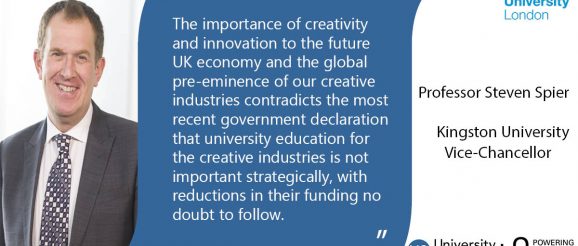Creative arts subjects vital for supporting UK innovation and economy | University Alliance

As University Alliance member Kingston University today releases their #FutureSkillsLeagueTable campaign, which champions the importance of creative skills for employers and warns against the undervaluing of creative courses by government policy decisions, we’ve gathered some case studies which emphasise the importance of creative arts graduates to the modern jobs market.
Alliance universities are central to the innovative and ever-growing creative sector – from traditional disciplines such as music, through to modern computer aided design, gaming and graphic design.
Our partnerships with major employers from Adobe to Netflix mean students are benefitting from industry- led teaching, in cutting-edge facilities – preparing a highly-skilled workforce who help contribute to the vast economic, social and cultural value the creative industries bring.
Alliance universities train over 15% of all creative arts and design students, and these courses provide a vital pipeline of talent for not only creative industries, but hundreds beyond them – into engineering, healthcare and technology among many others – and thus must be protected.
The creative skills gained through these courses bring value beyond the creative industries- with many graduates going on to start their own businesses, or bring entrepreneurship and creativity to industries such as manufacturing, helping to drive the nation’s future innovation and enterprise.
The HuffPost Centre for Journalism at Birmingham City University is creating the next generation of journalists, media experts and content creators.
In order to help support long-term economic growth, productivity and job creation, Birmingham City University’s STEAMhouse encourages co-working, collaboration and knowledge exchange between the arts, science, technology, engineering and maths (STEAM) sectors.
The TUCAN Studio at Teesside University was set up to support students and graduates to gain experience of working on paid real-life commercial projects, and broaden the use of their creative digital skills to be used in sectors such as engineering, healthcare and the police.
As their final project as Kingston University’s School of Art and Design, two former students won top honours at the Santander Entrepreneurship Awards for their business, which has developed a range of innovative and sustainable circular economy materials using potato waste.
Kingston University’s #FutureSkillsLeagueTable report included the top 10 professional attributes leading firms, including Deloitte, Mastercard and Lidl, consider key to business success. These include problem-solving, communication, critical thinking and digital prowess – all developed through studying creative subjects.
As Kingston University’s Vice Chancellor Steven Spier said:
“The importance of creativity and innovation to the future UK economy and the global pre-eminence of our creative industries contradicts the most recent government declaration that university education for the creative industries is not important strategically, with reductions in their funding no doubt to follow.”
Check out their #FutureSkillsLeagueTable report here, for more case studies and information on the campaign.
